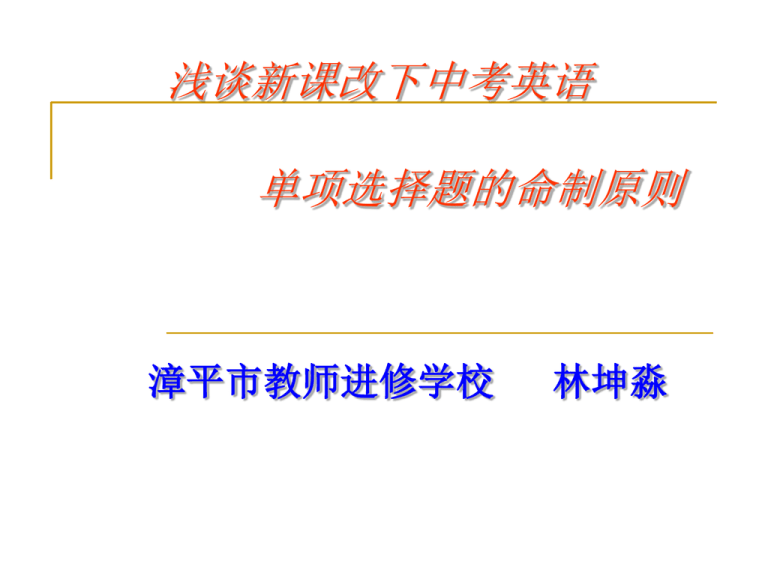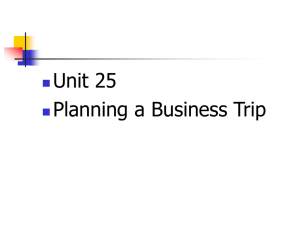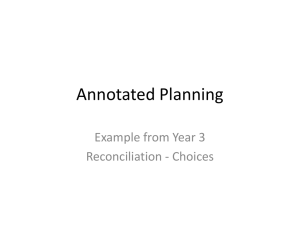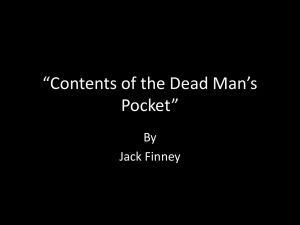答案A - 教师进修学校
advertisement

浅谈新课改下中考英语 单项选择题的命制原则 漳平市教师进修学校 林坤淼 单项选择题 单项选择题是全国各地初中英语毕业、升学考试(即“中考”)中 沿用已久的题型之一。在过去,单选题主要是被用来考查英语知识以 及阅读理解能力。近几年来,特别是新课改以来,课程标准规定:学 习英语的目标是发展学生综合语言的运用能力。所以命题者要把知识 型的测试转变为综合语言运用能力的测试。也就是说:1)在设计理念 上,注重题干的交际性质,加大口语交际力度,2)在话题选材上,增 加了试题的趣味性、时代性及新颖性。3)在语言知识上,增加了属于 情景应答类型的题目。4)在设计原则上,力求设计的科学性。从而改 变了过去的题干主要由清一色的单句组成,改变了过去的单选题目看上 去单调、枯燥、死气沉沉的局面。 新课标的要求给我们每个命题人员 提出了一个新的挑战,似乎觉得命单项选择题很简单,但要真正命好每 一道题是最不容易的。 因此,在这里我想根据自己多年来的观察和理解,每次统考命题的 做法,谈谈英语单选题设计中值得注意的几个问题,以求与广大初中英 语教师及命题者在设计或选用这一题型时共勉。 单项选择题的命制原则 一 题干的命制原则和注意事项 二 提高单项选择题干扰性的方法 三 难度值的把握 一、题干的命制原则和注意事项 1、以依据课标为原则,注重双基避免出现超标、超纲考点。 2、以严密的科学性为原则,保证答案唯一避免有争议或有误。 3、以考查综合运用能力为原则,创设语境避免单句的知识测试。 4、以贴近学生实际为原则、体现新颖、实用避免陈题。 5、以严谨、规范为原则,提高试题质量避免不合理。 6、以公平公正为原则,体现公平避免区域性的差别。 7、以真实的交际为原则、交际地道避免问题不真实的提法。 1、从考点的内容上讲,以依据课标为原则, 注重双基避免出现超标、超纲考点 (1)严把课标依据关 : A、考查词汇:根据复习指导丛书的附录不带٭号的单词。 B、考查短语:根据丛书附录不带٭号的单词所构成的短语。 C、考查语法:根据课标P53的语法项目表不带٭号的语法。 D、考查交际:根据课标P56的功能意念表不带٭号的用语。 下来属于超标的常用短语有: prefer… to , depend on , belong to , look forward to,of course, cheer on, cheer up, feel like doing, go ahead, go hiking,plug in, calm down, for sale, table manners, in detail, be harmful to, be based on, refer to, no doubt, click on, be similar to, ought to, for instance, prevent ... from, take measures 以下属于超标语法 A.时态 : 过去将来时* 过去完成时* 将来进行时* B.语态:(课标没规定,但课改后龙岩的中考试卷只考一般现在 时、一般过去时 和含情态动词,其他的时态不考) C.非谓语 :动词的-ing*,动词的-ed*形式(课标规定不考,但 我们的中考卷基本有考) D.成分: 补语* E.句型: 主语从句*;表语从句*;间接引语*;省略*;倒装*; 强调*; 虚拟语气* (2)课标外的功能 :指导丛书带*号的单词所构成的句子 (略) (2) 关注考点合理布局 常见中考单选题考查项目表:词汇占38%,动词占33%,句型占29% 一. 冠词 5 占6% 二. 代词 11 占12% 三.数词 3 占3% 四.名词 4 占4% 五.介词 3 占3% 六.连词 3 占3% 七.疑问词 4 占4% 八.情态动词 4 占4% 九.系动词 2 占2% 十.非谓语动词 6 占7% 十一. 动词短语 6 占7% 十二、动词时态 12 占13% 十三. There be 句型 3 占3% 十四、感叹句句型 3 占3% 十五、比较级句型 6 占7% 十六、宾语从句句型6 占7% 十七、被动语态句型 4 占4% 十八、定语从句句型 4 占4% 十九、倒装句句型 1 占1% 例1. ______ do my grandparents like Beijing Opera _____ my father and my uncle. A. Not only, but also B. Neither, nor C. Either, or D. Both, and not only... but also放在句首,后用倒装语序,超出了初中的考查范围。 在初中阶段可以这样命题: ____ Wang Fan ____ I am interested in the novel The Monkey King. Both of us like it. A. Both, and B. Not only, but also C. Neither, nor D. Either, or 答案B 从这一个原则来看下列试题有些不妥: 例2. ―Mary seems to like singing . ― ________, and ________.(2005龙岩卷) A. So she does; so do I B. So she does; so I do C. So does she ; so I do D. So does she; so do I 例3.The evening party the children were looking forward to ______ in the dining room yesterday. (2007龙岩卷) A. held B. was held C. holding 例4. Rather than ______ on a crowded bus , he always prefers ________ to school . (2008龙岩卷) A. to ride ; walk B. riding; walk C. ride; to walk 2、从可信度看,以严密的科学性为原则, 保证答案唯一避免有争议或有误。 (1)词汇多种语义,造成多种答案。 (2)句型多种结构,造成多种答案。 (3)问句多个意思,造成多种答案。 (4)英美表达不同,造成多种答案。 (5)语法人为错误,试题可信度低。 (1)单词多种语义,造成多种答案 例1: I wonder ____ he will come or not on time. A. if B. whether C. that D. when 此题中的A、B两个选项都可以和题干中的or not搭配。 如果改为这样命题较好。如: ___ you see him this morning, please ask John ___ he will have time tomorrow. A. Whether, if C. Weather, if B. If, whether D. If, weather 答案 B (2)句型多种结构,造成多种答案 例2: Please come here, ______? I need your help. A. will you B. won't you C. can't you 但在否定的祈使句后的反意疑问句通常只用will you, 此题可改为: Please don't play with fire,_______? It's dangerous. A. will you B. won‘t you C. can’t you 答案 A (3)问句多个意思,造成多种答案 例3: Do you have ______ paper? A. some B. any C . no D. a 如果增加意境改为: Do you have _______ paper? I want to write a letter.. A. some B. any C . no D. a 答案 A 例4: —What's under the table? —________. A. It's a dog. B. There is a dog. C. It has a dog 答案 A (4)英美表达不同,造成多种答案 例5:Where is your father? He is ill _____ A. in the hospital B. in hospital C. at table D. at the table (5)语法人为错误,试题可信度低 例1. — Could you give me some ___ on how to learn English well? — Sure. (2008新疆卷) A. suggestions B. Messages C. informations D. advices 答案A. 例2. Though the player is over thirty, he can still run ___ some younger players. (2008广州卷) A. as fast as B. so fast as C. much fast than D. more faster than 答案A 例3. Can you tell me _____? A. who is he B. he is who C. who's this D. who he is 答案D. 例4. There ________ some apples in the tree. A. is B. are C. have D. Has 根据这一原则下列试题是否不妥。 例5. ―Could you tell me _______? ―Sorry, I don’t know . (2006年) A. where Bill lives B. where does Bill live C. Bill lives where D. where Bill live 例6. ―Could you tell me _______? ―This way , please . (2008年) A. where are the special shoes B. where the special shoes are C. the special shoes are where 3、从考查目的看,以考查综合运用能力为原则, 创设语境避免单句的知识测试 设置语境,突出交际,考查学生综合语言运用能力。尽量避免单纯 的语法或词汇测试, 但也要尽量少设不用理解语境就能答题的试题。 例1: — Why not go to the Great Wall this Saturday? — I’m afraid it’s not a good ___. Many of us have been there.(08江西卷) A. place B. day C. plan D. idea 答案D 例2:—I have to get to the airport at ten o'clock but it is nine twenty now. — _____! I can send you there by car. A. That‘s a deal B. Hurry up C. Don’t worry D. Try your best 答案C 例3:—Do you have anything more ____, Sir? — No, you can have a rest now. A. typing B. to be typed C to type D. typed 答案B 例4:—Which of those electronic dictionaries do you like most? —______. They are both expensive and of little use. A. None B. Neither C. All D. Both 答案A 例5 —I feel ashamed to have dropped your cell-phone to the ground. —______. It works as well anyway. A. No problem B. Never mind C. It’s nothing serious D. It’s OK 答案B 下列纯属单句的语法测试或语境不起作用的试题不可取。 例6:I ____ home yesterday. (单句没语境) A. go B. went C. will go D. have gone 答案 B 例7: I think real cards are ____ than e-cards. (08北京卷)(看到than能答) A. nice B. nicer C. nicest D. the nicest 答案 B 例8:The man also wrote ____ of beautiful pieces of music for the orchestra. (08天津卷)(根据固定短语hundreds of 就能选) A. hundred B. six hundred C. a hundred D. hundreds 答案 D 例9:―Have you finished ______ the novel A new story about Lei Feng ? ―Yes . It’s very interesting. (根据finish doing 固定搭配就能选) (06龙岩卷) A. read B. reads C. reading D. to read 根据这一原则下列试题是否不妥。 例10:My uncle ______ in Fuzhou since 2005. (06龙岩卷)(单句纯语法) A. Work B. has worked C. worked D. had worked 例11:On April Fools’ Day people enjoy _____ jokes on others . (05龙岩卷) A. play B. to play C. playing D. plays(enjoy doing sth搭配) 4、从语境的话题看, 以贴近生活有教育为原则 体现新颖、实用避免陈题 (1) 联系生活实际 考查应用能力 (2) 考查中西文 化差异拓展 学生的视野 (3) 渗透学科整合 注重不同学科 间知识的内在 联系 (4) 体现时代气息 关注社会热点 (5) 体现试题的价 值立意和教育 功能 (1)联系生活实际,考查应用能力 例1:Which sign can you probably see in the library? A. NO SMOKING B. NO BOATING C. DANGER D. DON‘T TURN LEFT (答案A) (2)考查中西文化差异,拓展学生的视野 例2: —You speak good English. —_______. A. No, I don't B. Yes, I do C. Thank you D. Not at all (答案 C) (3)渗透学科整合, 注重不同学科间知识的内在联系 例4:The Yellow River is ____ the Changjiang River. A. not so long as B. as long as C. longer than D. long as (答案A) (4)体现时代气息,关注社会热点 例1: Ren Changxia, a policewoman, was always very busy. She had little time to spend ____ his family. A. about B. on C. with D. in ( 答案 B ) 例2:Do you know the brave boy _____saved several classmates in the earthquake? (09龙岩卷) A. who B. what C. which (答案A) 例3:―What’s the slogan of Beijing 2008 Olympics , Mr. Gao ? ―Oh , it’s “______World , One Dream .” (06龙岩卷) A. One B. Ones C. One’s D. Once (答案 A) 例4:It takes us only 26 hours to travel ____ Longyan to Beijing by train. (06年) A. for B. of C. with D. from (答案 D) 例5:Which of the following is for the World Expo 2010? (10年济南市) A B C D (答案 B) 例6:Lots of football fans plan____ the FIFA World Cup in South Africa. (10年济南市) A. watch B. watches C. to watch D. watched (答案 C) (5)体现试题的价值立意和教育功能 例1:— English is ____ too difficult for me. I can’t learn it well. — Don’t give up. Nothing is difficult if you work hard. (08安徽卷) A. seldom B. never C. always D. usually (答案C) 5. 从考题的设置看, 以严谨、规范为原则, 提高试题质量, 避免违规,不合理 (1) 设置题干和题空 (2) 设置选项 (3) 选项语法、结构正确 不能出现人为错误 (1) 设置题干和题空 题干句子要力求地道、准确、自然、清新;句子不得太短(对话例 外),但最长不得多超过两行。题空一般是1空;少设2空;不得设3空。 也最好少设第一空。 例1: He looks _____ , he is playing ____. (双空) A. happy , happily B. happy , happy C. happily , happily D. happily , happy. 例2: — Boys and girls! Please_____ your compositions after class. — Oh,my God! I____ it at home.(2008山东潍纺卷)(双空) A. hand in;forgot B. hand in;left C. hand out;forgot D. hand out;left (答案B) 例3: If you are weak_____ a subject,_____ and asking a teacher for advice can help. (2008山东卷)(双空) A. at;working hard B. in;work hard C. at;work hard D. in;working hard (答案D) 上述三题都同时考察了两个语言点,如果很多学生没能答对这些题 目,就很难判断学生的困难所在。 (2) 设置选项 三或四个选项的长度要相近, 不能其中一项偏长或不符题干语法 选项的内容性质要一致,不能串项 选项语法、结构正确不能出现人为错误 ① 三或四个选项的长度要相近, 不能其中一项偏长或不符题干语法 例1:This passage mainly tells us something about _______. A. the football season in the USA B. football is more interesting than baseball in the USA C. the difference between baseball and football D. the baseball season in the USA 例2:—Where is Tom? —He’s left a ____ saying that he has something important to do. A. excuse B. sentence C. news D. message 由于这样的选项起不到应有的作用,只能是形同虚设,因此应为 试 设计者所避免。如例1中的B可改为“the popularity of football in USA”, 例2则可把题干中的不定冠词“a”下放到选项中,使选项成为: A. an excuse; B. a sentence; C. news; D. a message。 ② 选项的内容性质要一致,不能串项 如不可同一题中的选项同时出现名词和动词等不同词性或杂项。 例3:Football is ____ an exciting sport that people all over the world love it. A. so B. rather C. such D. quite (答案C) 例4: Thomas, please be quiet. The others ____ hear very well. (08河北卷) A. can’t B. mustn’t C. shouldn’t D. needn’t (答案A) 例5:Ted’s mother kept telling Ted not to tell lies, but _______ didn’t help. A. which B. it C. she D. he (答案B) 例6:Beth has a beautiful ______ . Listen! She is singing very well. A. voice B. look C. sound D. smell (答案C) 例7: You’d better not _____ here . The smoking area is over there . (2008年) A. smoke B. to smoke C. smoking (答案A) 例8: Mother is ill in bed. I have to ______ her at home. (2009龙岩 卷) A. wait for B. think about C. look after 以下为不科学的选项设置: 例9:The coffee ____ has no sugar in it sells well.(不同词类串项) A. though (连) B. which (代) C. but (连) D. even (副) 例10: — Look! How _____ the boys are!(不同词类串项) — Yes. They won the game this afternoon. (2008陕西卷) A. exciting B. excitement C. excite D. excited 例11:In our exam, the more careful we are, the ____ mistakes we’ll make. (其中一项不同级别,误导) A. little B. better C. fewer D. smaller 例10:I’m hungry. Please bring me some ____. 其中一项不同类别误导 A. kites B. desks C. boxes D. cakes 例11:Tom’s mother got angry because ______. 其中一项不同 主语误 A. Tom was all wet B. Tom was punished C. Tom was dry D. it rained ③ 选项语法、结构正确,不能出现人为错误 例12:Mr. Brown often ______ to work by bus and seldom on foot. (人为错误,误导) A. go B. goes C. gos D. gone 例13:Julia watches TV six hours a day, eats a lot of junk food, and she never exercises. So she is _____ . (08四川自贡卷)(人为错误,误导) A. Unhealthy B. Healthy C. in good healthy 6、以公平公正为原则, (1)考查跨学科的试题, 体现公平避免区域性的差别 只能渗透考查运用, (1)考查跨学科的试题,只能渗透考查运用, 不能考查智力知 不能考查智力知识。 例1: Which of the following does paper burn in? 识。 A.CO2 B.N2 C.O2 D.H2 (2)设题尽量一空,少设两空。 例2:— If a=3, b=4, what’s the answer to the question a+2ab+1=? — _____ . (08兰州卷) (3)考查共同熟悉的话题,避免地区差异的 A. Twenty-eighth B. Twenty-eight: C. Thirteen D. eighteen (答案B) 常识。 例3: The important sports festival, the Olympic Games,_____ held every _____ years. (08乌鲁木齐卷) A. is;five B. are;three C. is;four D. are;two (答案C) (1)考查跨学科的试题, 只能渗透考查运用, 不能考查智力知识。 境由心造 一花一世界 一沙一天堂 例1: Which of the following does paper burn in? A.CO2 B.N2 C.O2 D.H2 例2:—If a=3, b=4, what’s the answer to the question a+2ab+1=? — _____ . (08兰州卷) A. Twenty-eighth B. Twenty-eight: C. Thirteen D. eighteen (答案B) 例3: The important sports festival, the Olympic Games,_____ held every _____ years. (08乌鲁木齐卷) A. is;five B. are;three C. is;four D. are;two (答案C) 7、 从 交 交 际 际 地 背 道 景 避 看,免 以 问 真 题 实 不 为 真 原 实 则 的 、 提 法 (1) 交际的真实性。 (2) 交际的自然性。 (2)交际的自然性 (1) 交际的真实性。 例1:“She didn’t come to school yesterday, did she?” “_____, though she was not feeling very well.” A. No, she didn’t B. Yes, she did C. No, she did D. Yes, she did 例2:“Which of these two apples will you take? ” “I’ll take ____, and give one of them to my sister.” A. some B. both C. a few D. a little 例3:“Do you often hear John ______ in his room?” “Listen. Now we can hear him ______ in his room.” A. sing…to sing B. singing…singing C. sing…singing D. to sing…singing 例2:“Which apple will you take, the red one or the yellow one?” “I’ll take ____, and then give one to my sister.” 例3:“Listen! Can you hear John ______ in his room?” “Really! I seldom heard him _____ before.” (2)交际的自然性 例1:“What a nice garden!” “It _____ every day.” A. is cleaning B. has cleaned C. must clean D. is cleaned 例2:Could you tell me _________? A. where does Tom live B. where Tom lives C. where Tom live 该题干选取的显然是问路时的情形,如果能在句首加上 “Excuse me,” 则该片段会显得更真实。 例3:“Do you like this pair of shoes?” “No. Show me ______.” A. the different ones B. other one C. another one D. another pair 该题题干。如改为:“I’m afraid not. Can you show me ______ ?”,则效果会好得多。 二、提高单项选择题干扰性的方法 1 利用相似知识 2 利用英汉语言差异利用汉语习惯 3 利用“定势思维” 4 利用提示与铺垫 1、利用相似知识 英语中许多词、词组与句型极为相似,但其用法差异很大。 命题时若将这些内容合理安排在一起,可以有效地提高干扰性。 如: 例1. Do you know if he ___ to the zoo tomorrow if it ___? A. will go, is fine B. goes, is fine C. will go, is going to be fine D. goes, is going to be fine 2、利用英汉语言差异利用汉语习惯。 英汉两种语言,在词汇、结构、惯用语等方面存在着较大 差异,命题时若从这一角度加以设计,可以有效地考查学生的 实际英语水平。如: 例1. — How long can I ____ the book? — Two weeks. A. borrow B. keep C. lend D. renew 3、利用“定势思维” 所谓“定势思维”是指利用所学的某一知识或根据某一经验 解决相似问题时产生的一种心理倾向。学生在学习过程中,往往 只注意带普遍性的问题,而不善于总结特殊用法及表达方式,因 而答题时极易产生定势思维。如: 例1:— Would you like some coffee? — Yes, and please get me some milk, too. I prefer coffee ___ milk. A. to B. with C. than D. of 例2:She will do all she can ____ her friends. A. to help B. help C. helps D. helping 4、利用提示与铺垫 设计单项选择题时,在题干中巧妙地安排某些词、短语或句 子,可以对其答案进行限制,以考查学生准确的读题能力和合理 的逻辑推理能力。如: 例1:"Help ____ to some fish," Mrs. Green said to the guests. A. yourself B. you C. your D. yourselves 例2:— Does she speak English or Russian? — She speaks ____. But she knows some German. A. both B. either C. neither D. none 提高单项选择题干扰性的方法并不局限于以上几种。在命题 过程中,只要我们从学生的实际出发,尽量多角度、多方位设计, 扩大考查面,提高试题综合性,就可以达到培养学生综合运用英 语的能力和判断、推理能力的目的。 三、难度值的把握 考纲要求难度值应为8:1:1. 也就是说简单题占80%; 中等题占10%;难题占10% 所谓简单题:就是从语境的表面意思就可获取 信息得出答案,不用通过两步判断,推理 所谓中等题:就是从语境意思,通过两个知识 点来判断推理得出的答案。 所谓难题:就是从语境意思通过三个知识点来 判断推理得出的答案 。 (1) Nothing in ____ world is difficult if you set your mind to do it. A. a B. an C. the D. / (2) Please _____ your coat. It’s cold outside. A. put on B. take off C. look after D. pay for (3) You may go out to play if your homework ______. A. does B. is done C. will do D. did (4) How new your bike is! Yes, I ______it for only a few days. A. bought B. have bought C. have had D. buy. (5) When Mr. Smith ____ ,let me know, I’ll come and say “Goodbye” to him. A. goes back B. comes back C. will go back D. returns back (1)—(5):CABCA 四 、结语 总之,作为一种独特的语言测量形式, 单项选择题的设计有着自己独特的规范,有 着值得设计者们注意的问题。本文将笔者认 为最常见的几个问题提出来进行了分析,目 的是希望我们的命题人员及教师在今后设计 这类考题时能充分考虑这些问题,同时也关 注前面最近几年的中考题型,避免同一个知 识点同一种形式考。从而避开不合理的设计, 提高命题质量。





